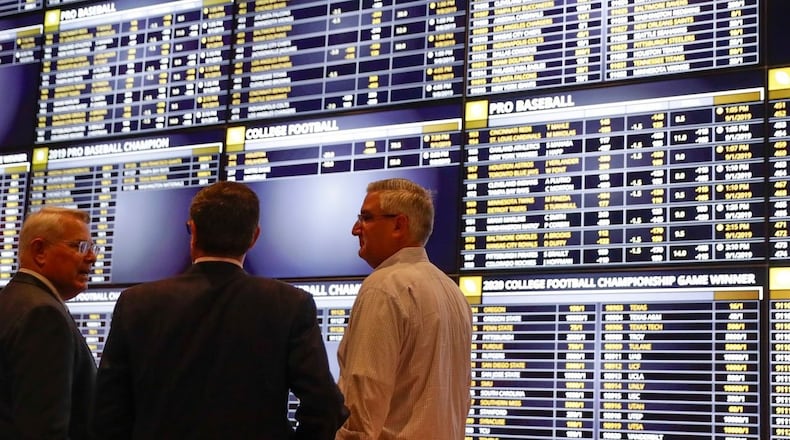The sports betting bill would allow 53 licenses to be issued for taking wagers on professional and college sports. That’s an increase from 40 licenses in the original version of the bill.
The legislation was approved by a vote of 30-2.
Twenty-five of those licenses would be available to Ohio’s casinos and horse racing tracks called racinos, which could then partner with outside companies to provide sports betting online or mobile apps.
Another 33 licenses would be for brick-and-mortar locations that could include casinos, racinos, sports bars or betting shops where people can watch and wager on games.
“Our coalition is grateful for the care in crafting a bill providing opportunities for fair market access to Ohio’s pro sports organizations, which produces the games that make sports betting possible,” the Ohio Professional Sports Coalition said in a statement.
The bill also allows betting on Ohio university football and basketball games, which the Inter-University Council of Ohio opposes. Council CEO Bruce Johnson says legalized sports betting will require universities to monitor athletes to ensure they are not involved in point shaving and students are not dealing inside information to bettors.
The bill also allows for betting kiosks in bars and nightclubs that serve hard liquor. Betting will be limited to point spreads, total points scored in a game and money lines, which is an odds-based bet on which team will win. It also imposes a $200 a day betting limit.
In addition, the legislation would permit electronic bingo at veteran’s and fraternal organizations overseen by the Ohio Attorney General’s Office and sports pool betting run by the Ohio Lottery Commission.
Sports betting would begin no earlier than January 2022 under the bill. Ohio could earn about $17 million in tax revenue for the fiscal year beginning July 1 of 2022 and $23 million the following year, according to a legislative analysis. The bill calls for 98% of the tax to be deposited in an education fund and the remaining 2% in a fund for problem sports gambling.
Under the college athlete compensation bill, universities or college athletic conferences would be prevented from punishing athletes if they are compensated based on their sports performance.
Such compensation could involve anything from a book-signing at a bookstore to a deal with a local restaurant. Exceptions include sponsorships for marijuana, alcohol, tobacco and casinos, which are not permitted under the bill, according to bill sponsor Senator Niraj Antani (R-Miamisburg).
He told the Dayton Daily News feedback on the name, image and likeness bill has been tremendous.
“I think that people understand why we need to do this for student-athletes,” he said. “The student-athletes have an inherent right that they should have the ability to benefit and earn compensation off of their name image or likeness, and now is the time to do this.”
Athletes would have to notify universities 15 days ahead of signing endorsement contracts. The Senate Workforce and Higher Education Committee approved the bill Tuesday, the same day Ohio State University football coach Ryan Day testified that quick passage was needed to ensure other states with similar legislation would not put Ohio schools at a recruiting disadvantage.
Since 2019, at least 16 states — including Arizona, Nebraska, and Michigan — have approved legislation allowing college athletes to make money through advertisements, sponsorship deals and other types of promotions based on their athletic success.
Five of those bills — approved by Alabama, Florida, Georgia, Mississippi and New Mexico — become law July 1.
Antani told the Dayton Daily News passing both bills involve a matter of competition with other states.
“On sports betting, every other border state except for Kentucky does it,” Antani said. “On name image or likeness, 16 other states are, including five of which are going into effect on July 1. So, yeah, certainly we have a duty in Ohio to lead, and I think we need to lead on sports betting and on name image or likeness.”
While some area colleges reserved comment until the legislation becomes law or indicated they were still working on plans, Ohio State Director of Athletics Gene Smith and Dayton counterpart Neil Sullivan both expressed support when the bill was introduced last month.
“The university’s view is it’s inevitable that that name, image, likeness opportunities are coming to college sports,” Sullivan said “I think anyone that’s been following it realizes it’s time. And it’s been an issue that’s been discussed for really decades within the NCAA, but that clock’s ready to strike midnight.”
Antani said in his view, Ohio citizens are in favor having the ability to gamble on sports legally in the state.
Regarding the gambling bill, he said, “You know what? The people want this, the citizens want this they want to be able to bet on sports. Obviously this is an extremely important issue and lots of interests are here via the casinos or racinos and via the sports teams, but at the end of the day this is about the people and this is about what the people want and they want to be able to bet on sports and that’s what this bill does. It does it in person, it does it online, it does it through the lottery, and so people have plenty of options under this bill to be able to bet on sports and I think that’s something that we’re proud of and we’re very hopeful that this will get done and to the governor’s desk very quickly.”


